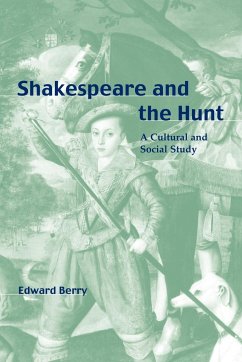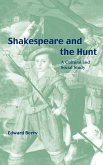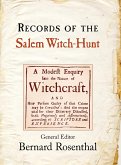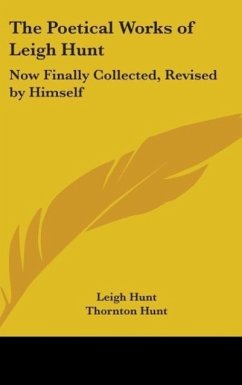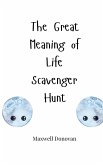A book-length study of Shakespeare's works in relation to the culture of the hunt in Elizabethan and Jacobean society.
Shakespeare and the Hunt is the first book-length study of Shakespeare's works in relation to the culture of the hunt in Elizabethan and Jacobean society. The book explores topics generally unfamiliar to Shakespeareans, such as the variety of kinds of hunting in the period, the formal rituals of the hunt, the roles of Queen Elizabeth and King James as hunters, the practice of organized poaching, and the arguments both for and against hunting. Situating Shakespeare's works in this rich cultural context, Berry illuminates the plays from fresh angles. He explores, for example, the role of poaching in The Merry Wives of Windsor; the paradox of pastoral hunting in As You Like It; the intertwining of hunting and politics in The Tempest; and the gendered language of falconry in The Taming of the Shrew.
Review quote:
'This is a comprehensive, stimulating, necessary, and very informative study -' Folio
'This exploration produces an admirably immediate picture of the world of the English hunt in the decades surrounding 1600. - anyone interested in the history of hunting as sport - regardless of his or her acquaintance with Shakespeare - will find reading this book worth the effort.' The International Journal of the History of Sport
'- learned and sensitive - Edward Berry's informative study is a pleasure to read, not only for the unostentatious elegance and lucidity of its style. The author succeeds in making the hunt, which at first glance may seem to provide merely a limited insight into Shakespeare's art, an issue of prime critical importance - Berry's historicist interpretations are illuminating - Shakespeare and the Hunt is a notable achievement that provides useful insights into the playwright's ambivalent relationship with Elizabethan aristocratic culture.' Shakespeare Jahrbuch
Table of contents:
List of illustrations; Preface; Glossary; 1. Introduction: the culture of the hunt and Shakespeare; 2. Huntresses in Venus and Adonis and Love's Labour Lost; 3. 'Solemn' hunting in Titus Andronicus and Julius Caesar; 4. The 'manning' of Katherine: falconry in The Taming of the Shrew; 5. The 'rascal' Falstaff in Windsor; 6. Pastoral hunting in As You Like It; 7. Political hunting: Prospero and James I; 8. Conclusion: Shakespeare on the culture of the hunt; Notes; Index.
Hinweis: Dieser Artikel kann nur an eine deutsche Lieferadresse ausgeliefert werden.
Shakespeare and the Hunt is the first book-length study of Shakespeare's works in relation to the culture of the hunt in Elizabethan and Jacobean society. The book explores topics generally unfamiliar to Shakespeareans, such as the variety of kinds of hunting in the period, the formal rituals of the hunt, the roles of Queen Elizabeth and King James as hunters, the practice of organized poaching, and the arguments both for and against hunting. Situating Shakespeare's works in this rich cultural context, Berry illuminates the plays from fresh angles. He explores, for example, the role of poaching in The Merry Wives of Windsor; the paradox of pastoral hunting in As You Like It; the intertwining of hunting and politics in The Tempest; and the gendered language of falconry in The Taming of the Shrew.
Review quote:
'This is a comprehensive, stimulating, necessary, and very informative study -' Folio
'This exploration produces an admirably immediate picture of the world of the English hunt in the decades surrounding 1600. - anyone interested in the history of hunting as sport - regardless of his or her acquaintance with Shakespeare - will find reading this book worth the effort.' The International Journal of the History of Sport
'- learned and sensitive - Edward Berry's informative study is a pleasure to read, not only for the unostentatious elegance and lucidity of its style. The author succeeds in making the hunt, which at first glance may seem to provide merely a limited insight into Shakespeare's art, an issue of prime critical importance - Berry's historicist interpretations are illuminating - Shakespeare and the Hunt is a notable achievement that provides useful insights into the playwright's ambivalent relationship with Elizabethan aristocratic culture.' Shakespeare Jahrbuch
Table of contents:
List of illustrations; Preface; Glossary; 1. Introduction: the culture of the hunt and Shakespeare; 2. Huntresses in Venus and Adonis and Love's Labour Lost; 3. 'Solemn' hunting in Titus Andronicus and Julius Caesar; 4. The 'manning' of Katherine: falconry in The Taming of the Shrew; 5. The 'rascal' Falstaff in Windsor; 6. Pastoral hunting in As You Like It; 7. Political hunting: Prospero and James I; 8. Conclusion: Shakespeare on the culture of the hunt; Notes; Index.
Hinweis: Dieser Artikel kann nur an eine deutsche Lieferadresse ausgeliefert werden.

